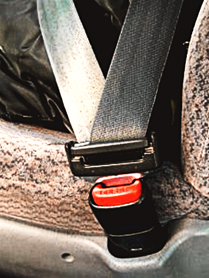NHTSA: Seat Belt Use Reaches New High
![]() Print this Article | Send to Colleague
Print this Article | Send to Colleague
 Traffic deaths have been on the rise this year, and as auto makers tout safety advances like autonomous braking and lane-keep assist, the National Highway Traffic Safety Administration (NHTSA) says that more people are buckling their seat belts than ever before.
Traffic deaths have been on the rise this year, and as auto makers tout safety advances like autonomous braking and lane-keep assist, the National Highway Traffic Safety Administration (NHTSA) says that more people are buckling their seat belts than ever before. NHTSA reported on November 21 that 90 percent of all drivers and front-seat passengers were buckled, according to a survey from June. That's an increase from a similar survey taken last year, which found that 89 percent of drivers and front passengers were belted.
"We are encouraged by this progress, but with so many people still dying in crashes because they are not wearing their seat belts, we will not rest until we reach 100 percent," NHTSA Administrator Mark Rosekind said.
According to the agency, seat belts saved nearly 14,000 lives during 2015 and have saved around 345,000 lives since 1975. But there is still room for improvement.
Nearly half of the people killed in crashes in 2015 - 48 percent - were not wearing a seat belt. When used correctly, lap/shoulder belts reduce the risk of fatal injury to front-seat passenger car occupants by 45 percent and the risk of moderate-to-critical injury by 50 percent.
This seat belt usage data is encouraging news in a year that saw the number of traffic deaths jump by 10 percent, climbing to 17,775 in the first six months of this year compared to 2015.
While an increase in miles driven contributed to the increase in fatalities, so have increasing risks from texting and driving.
This latest survey found that seat belt use is higher in the western United States. More drivers are also buckled in states like Michigan, which enforce primary belt-use laws. Thirty-four states and the District of Columbia have primary seat belt laws for front-seat occupants. Fifteen states have secondary enforcement for older drivers and primary enforcement for drivers younger than 18 years of age.

